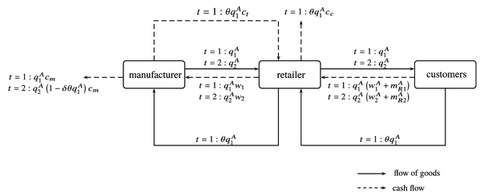05.12.2023
Neuer Beitrag im "Flexible Services and Manufacturing Journal"
Wir freuen uns über eine neue Veröffentlichung unseres Lehrstuhl in der Zeitschrift "Flexible Services and Manufacturing Journal" mit dem Titel "Pricing decisions in a two-period closed-loop supply chain game under asymmetric information and uncertainty". Maria Beranek und Udo Buscher haben dafür die Auswirkungen von asymmetrischen Informationen und Unsicherheiten auf die Wahl der Sammelstrategie von Altprodukten in einer Closed-Loop Supply Chain spieltheoretisch untersucht.
Die Publikation kann unter folgender Link abgerufen werden:
https://link.springer.com/article/10.1007/s10696-023-09524-8
Abstract:
Strategies to increase sustainability are of growing relevance for supply chains and especially for the management of production processes. In this paper, we build on existing literature in closed-loop supply chain management and consider a two-period game-theoretic model in which product returns are reused in the manufacturing process. In all scenarios, we assume that the return rate of used products is random and not known to the players at the beginning of the planning horizon, thus, they have to deal with uncertainty in period 1. In contrast to existing literature, we will also address the circumstance that the players’ level of information in period 2, after the returns have been realized, can be linked to the collection mode in the supply chain. In Scenario A, the retailer is involved in the collection of the used products and transfers them to the manufacturer, so that symmetric information is available. In Scenario B, on the other hand, the used products reach the manufacturer directly from the customer, so that the manufacturer has an information advantage over the retailer. By comparing these scenarios and a vertically integrated supply chain benchmark case, it becomes clear that, depending on the actual return rate, the presence of private information can be either beneficial or detrimental to the manufacturer. The retailer, on the other hand, can compensate for information disadvantages in most cases over the multi-period planning period due to its position as a Stackelberg leader. Regardless of the amount of a transfer payment offered to it by the manufacturer, it prefers the collection of the goods by the manufacturer itself. These findings contribute to literature on symmetric information, where, for example, a retailer-led collection is preferred (Savaskan et al. Manage Sci 50(2):239–252, 2004) or the decision depends on the amount of the transfer payment (Modak et al. J Clean Prod 171:512–528, 2018). However, we show that cooperation between the players leads to the best results not only economically but also from an ecological point of view.

